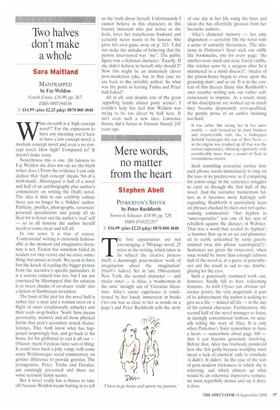Mere words, no matter from the heart
Stephen Abell
PINKERTON'S SISTER by Peter Rushforth
Simon & Schuster, 418.99, pp. 729, ISBN 0743252357 Ct.) £16.99 (plus £2.25 p&p) 0870 800 4848 £16.99 (plus £2.25 p&p) 0870 800 4848
The first appearances are not encouraging: a 700-page novel, 25 years in the writing, which takes as its subject the creative process itself; a dauntingly post-modern 'work of imagination about the imagination' (blurb's italics). Set in late 19th-century New York, the central character — and titular sister — is Alice, a 'madwoman in the attic' straight out of Victorian literature, Alice's entire experience is conditioned by her lonely immersion in books ('no one was as close to her as words on a page') and Peter Rushforth tells the story
of one day in her life using the lines and ideas she has effortfully gleaned from her favourite authors.
Alice's cluttered memory — her attic disposition — certainly fills the novel with a sense of unwieldy literariness. The allusions in Pinkerton's Sister stick Out stiffly like bookmarks, one for every page: 'the stitches were small and neat, barely visible, like stitches sewn by a surgeon after he'd ministered to a mind diseas'd'; 'shades of the prison-house began to close upon the groaning man'; and so on. It is in the context of this literary litany that Rushforth's own creative writing sets out rather selfconsciously to impress. As a result, many of his descriptions are worked up so much they become desperately over-qualified, the purple prose of an author straining too hard:
It was rather like seeing her in her automobile — well trussed-up in plaid blankets and impenetrable veils, Like a kidnapped Scottish beekeeper the size of Ben Nevis — as the engine was cranked up (if that was the correct expression), vibrating vigorously, with considerably more than a pound of flesh in mountainous motion.
Such stumbling evocation (notice how each phrase seems immediately to step on the toes of its predecessor, as if competing for centre-stage in the sentence) struggles to carry us through the first half of the novel. And the narrative momentum falters as it becomes more haltingly selfregarding; Rushforth is particularly keen on phrases checked by their own not-quiterunning commentary: 'that hyphen in "unco-operative" was one of her acts of rebellion against the dictates of Webster. That was a word that needed its hyphen': 'a hammer flew up in an arc and plummeted to earth, unleashed by some gauche sinistral (was this phrase tautological?)'. Sentences are given the twice-over, when once would be more than enough (almost half of the novel is, at a guess, in parenthesis) and the result is, sad to say, doubleglazing for the eyes.
Such a generously crammed work can, however, hardly fail to have redeeming features. As with Ulysses (an obvious reference point), the very magnitude is part of its achievement: the author is seeking to give us a life — indeed all life — in the day of his central character. Furthermore, the second half of the novel manages to focus, in daringly conventional fashion, on actually telling the story of Alice. It is only when Pinkerton's Sister remembers to have a heart — somewhere about page 300 — that it can become genuinely involving. Before that, Alice has fruitlessly pondered how she 'felt guilty because wordplay must mean a lack of emotion' only to conclude 'it didn't. It didn't.' In the case of the sort of post-modern tricksiness to which she is referring, and which clutters up what would be an otherwise impressive venture, we must regretfully demur and say it does, it does.


















































































 Previous page
Previous page